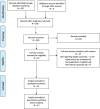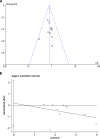Risk factors for postoperative complications in patients undergoing cytoreductive surgery combined with hyperthermic intraperitoneal chemotherapy: A meta-analysis and systematic review
- PMID: 39422815
- PMCID: PMC11489289
- DOI: 10.1007/s00384-024-04741-5
Risk factors for postoperative complications in patients undergoing cytoreductive surgery combined with hyperthermic intraperitoneal chemotherapy: A meta-analysis and systematic review
Abstract
Objective: Cytoreductive surgery (CRS) combined with hyperthermic intraperitoneal chemotherapy (HIPEC) is one of the most effective treatments for intraperitoneal malignancies. However, current research on risk factors for postoperative complications needs to be more consistent. This study aimed to conduct a meta-analysis of the risk factors for postoperative complications in CRS + HIPEC patients.
Methods: Studies meeting the inclusion criteria were screened by searching the Embase, PubMed, Cochrane and Web of Science databases. RevMan and STATA software were used to analyze the data extracted from the included articles.
Results: A total of 15 articles with 4021 patients were included in the meta-analysis. The results revealed that sex, elevated peritoneal cancer index, prolonged duration of surgery and smoking habits were risk factors for postoperative complications in CRS + HIPEC patients. In contrast, BMI, eGFR, age, history of preoperative chemotherapy, history of preoperative surgery, and history of neoadjuvant therapy had no significant effect on postoperative complications in the CRS + HIPEC group. The effects of diabetes, hypertension, preoperative albumin level, tumor location and chemotherapy regimen on the occurrence of complications need to be further investigated.
Conclusions: We identified several risk factors for postoperative complications after CRS + HIPEC, which should help clinicians minimize the incidence of postoperative complications and make more beneficial decisions for cancer patients who need treatment.
Keywords: CRS; HIPEC; Meta-analysis; Postoperative complication; Risk factor.
© 2024. The Author(s).
Conflict of interest statement
The authors declare no competing interests.
Figures







Similar articles
-
Risk factors for postoperative acute kidney injury after cytoreductive surgery combined with hyperthermic intraperitoneal chemotherapy: a meta-analysis and systematic review.World J Surg Oncol. 2025 Feb 4;23(1):40. doi: 10.1186/s12957-025-03657-w. World J Surg Oncol. 2025. PMID: 39905442 Review.
-
Repeat Cytoreductive Surgery and Hyperthermic Intraperitoneal Chemotherapy Using Open and Closed Abdomen Techniques for Colorectal Peritoneal Metastases and Peritoneal Pseudomyxoma Recurrences: Results from Six French Expert Centers.Ann Surg Oncol. 2025 Jan;32(1):209-220. doi: 10.1245/s10434-024-16407-1. Epub 2024 Nov 4. Ann Surg Oncol. 2025. PMID: 39496899
-
Robotic cytoreductive surgery and hyperthermic intraperitoneal chemotherapy: is there a benefit?Surg Endosc. 2025 Jan;39(1):513-521. doi: 10.1007/s00464-024-11199-7. Epub 2024 Oct 16. Surg Endosc. 2025. PMID: 39414669 Free PMC article.
-
Impact of residual disease as a prognostic factor for survival in women with advanced epithelial ovarian cancer after primary surgery.Cochrane Database Syst Rev. 2022 Sep 26;9(9):CD015048. doi: 10.1002/14651858.CD015048.pub2. Cochrane Database Syst Rev. 2022. PMID: 36161421 Free PMC article. Review.
-
Acute kidney injury after cytoreductive surgery and hyperthermic intraperitoneal chemotherapy - A systematic review.Eur J Surg Oncol. 2024 Dec;50(12):108622. doi: 10.1016/j.ejso.2024.108622. Epub 2024 Aug 28. Eur J Surg Oncol. 2024. PMID: 39216462 Review.
References
-
- Sugarbaker PH (2006) New standard of care for appendiceal epithelial neoplasms and pseudomyxoma peritonei syndrome. Lancet Oncol 7(1):69–76 - PubMed
-
- Foster JM, Zhang C, Rehman S, Sharma P, Alexander HR (2023) The contemporary management of peritoneal metastasis: A journey from the cold past of treatment futility to a warm present and a bright future. CA Cancer J Clin 73(1):49–71. 10.3322/caac.21749 - PubMed
-
- Elias D, Lefevre JH, Chevalier J, Brouquet A, Marchal F, Classe JM, et al. Complete cytoreductive surgery plus intraperitoneal chemohyperthermia with oxaliplatin for peritoneal carcinomatosis of colorectal origin. J Clin Oncol 2009 Feb 10;27(5):681e5. 10.1200/JCO.2008.19.7160. - PubMed
-
- Glehen O, Gilly FN, Arvieux C, et al. Peritoneal carcinomatosis from gastric cancer: a multi-institutional study of 159 patients treated by cytoreductive surgery combined with perioperative intraperitoneal chemotherapy. Ann Surg Oncol 2010 Sep;17(9):2370e7. 10.1245/s10434-010-1039-7. - PubMed
-
- van Driel WJ, Koole SN, Sonke GS, et al. Hyperthermic intraperitoneal chemotherapy in ovarian cancer. N Engl J Med 2018 Jan;378(3):230e40. 10.1056/NEJMoa1708618. - PubMed
Publication types
MeSH terms
LinkOut - more resources
Full Text Sources
Medical
Research Materials
Miscellaneous

